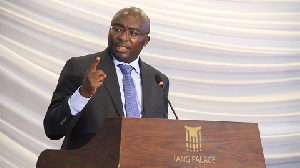Vice President Dr. Mahamadu Bawumia says the time has come for Ghana to take the electronic payment agenda a notch higher.
Speaking recently at the 10th anniversary celebration of the Ghana Interbank Payment Settlement & Systems in Accra, Dr Bawumia stated: “Ghana has a robust payment infrastructure which places us at an enviable position to take the world by storm. What is required is a holistic and joint effort of all stakeholders to shift behaviours towards electronic payment options. Let me therefore urge the financial institutions to work closely with GhIPSS and to vigorously promote these channels of payments.”
Commending GhIPSS for its efforts over the years, the Vice President noted that from processing just about GH¢3.8 million worth of transactions in its first year, GhIPSS has recorded a phenomenal growth in the value of transactions, rising to a whopping GH¢47.3 billion in the first quarter of this year alone.
“While South Africa has about 86 percent of its adult population with access to banking, we have just about 35 percent. Our neighbour, Nigeria is recording a drop in the issuance of cheques while internet banking, mobile banking, and POS usage are on the rise, clearly showing that electronic payment is deepening in that country. If we deepen the usage of these electronic payment channels, we as individuals will benefit from it, businesses will gain significantly and the economy as a whole will be richer for it.”
He continued: “As you might be aware, the government is also working to ensure that we have a proper National Identification System in place, again before the year ends. If we achieve these, which I believe we can, our financial sector would witness a huge transformation that we have never witnessed. I say so because, our financial services would have the most effective primary and unique identifier of each person and with the plethora of electronic payment delivery channels, coupled with the macroeconomic stability we are pursuing, one can envisage the massive flow of credit to the private sector that will occur. The resultant business expansion, job and wealth creation will follow naturally.”
Sheikh Jobe, CIO of Standard Chartered Bank Ghana & West Africa, in a presentation, referred to a November 2016 KPMG report, which indicated that the high cost of electronic transactions remained the greatest obstacle to attaining the goal of a “cash-lite” economy.
He also said the availability of interest bearing products on mobile wallets would also drive the financial inclusion objective of the Bank of Ghana (BoG) and Government of Ghana.
Commenting on entry and operating barriers for merchants and customers, he said the lack of interest-earning solutions from mobile wallet providers must be addressed.
“A right pricing model is critical to drive adoption. An instant interbank transfer of GHS1,600 costs around $5 at Ghana banks but just $1 at Nigeria’s banks.”
Eli Hini, General Manager, Mobile Financial Services, MTN Ghana, said the unbanked population in Ghana represents about 7 percent of the population, adding that that presented a huge opportunity for growth of mobile financial services in the country to accelerate financial inclusion.
“In Ghana today, mobile money has been adopted by many in the country and it’s serving as the perfect driving wheel for financial inclusion in Ghana. More than 40 percent of the adult population in Ghana use mobile money on 90 day activity cycle.”
To deepen Ghana’s financial inclusion and expand payments in rural areas, he advised that payment for services in agriculture, health, transport should be instituted.
Business News of Wednesday, 7 June 2017
Source: dailyguideafrica.com













